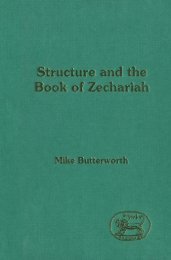Appendix CASE ONE - Collection Point® | The Total Digital Asset ...
Appendix CASE ONE - Collection Point® | The Total Digital Asset ...
Appendix CASE ONE - Collection Point® | The Total Digital Asset ...
Create successful ePaper yourself
Turn your PDF publications into a flip-book with our unique Google optimized e-Paper software.
70 Legal History in the Making<br />
of the Institutiones, but it is reasonable to suppose that some were expected<br />
to do so. Cowell's copious citations certainly indicated a great deal of effort to<br />
make the work useful for practising common lawyers. As Co well knew from<br />
looking over the works he was citing, students of the common law were already<br />
encountering most of the Institutes' major categories, suffused through the rest<br />
of their professional literature. His text was more accessible and useful than<br />
the editions of Bracton and Glanvill they were acquiring.<br />
Historians differ in their estimates of the impact of Cowell's Institutiones. One<br />
writes of its 'evident popularity', another calls it a 'spectacular failure'. 46 Both<br />
estimates derive from the same evidence. Latin editions of the Institutiones<br />
luris Anglicani were published in Cambridge in 1605, in Oxford in 1630 and<br />
1664 and in Frankfurt in 1630. An English translation appeared in London in<br />
1651 and was reprinted in 1676. Cowell's book thus had more printings than<br />
did, for example, Francis Bacon's Elements of the Common Laws, though of<br />
course many fewer than Coke's Institutes. 47<br />
Some historians have accounted for the 'failure' of the Institutiones, if that<br />
is what it was, by pointing to Cowell's decision to use Justinian's Institutes as<br />
his plan. Holdsworth, in particular, thought the form of the book 'exotic',<br />
unsuitable and forced. 48 This estimate goes too far. Cowell's idea to base his<br />
compilation on the Institutes was probably quite sound, given the familiarity<br />
of much of the basic terminology. But his decision to make absolutely no<br />
changes in the title headings he took from Justinian no doubt reduced the<br />
book's impact for students of the common law. Though he cited Bracton<br />
wherever possible for the classifications and much of the content of his book,<br />
Cowell's title page made no effort to hide the civil law origin of his format.<br />
<strong>The</strong> language, title and headings of the book all made it appear less a rational<br />
ordering of English law than an effort to show how much (or little) English<br />
law had in common with Roman law. 49<br />
In 1651, forty years after his death, Cowell's Institutes of the Laws of<br />
England gained a new readership in an English translation. <strong>The</strong> title page<br />
advertized that the book was translated 'according to Act of Parliament, for<br />
46 Compare Watson, 'Justinian's Institutes and Some English Counterparts', 184 ('evident<br />
popularity') and Levack, Civil Lawyers, 138 ('partially successful') with Coquillette, 'Legal Ideology<br />
and Incorporation', 73 and Civilian Writers, 80-81 ('spectacular failure') and Simon, 'Dr. Cowell',<br />
263 ('unsuccessful').<br />
47 Bacon's Elements was printed in 1630,1636 and 1639. R.W. Gibson, Francis Bacon: A Bibliography<br />
of His Works and of Baconiana to the Year 1750 (Oxford, 1950), xvi. Such a comparison is suggested<br />
by Bacon's own hope to surpass Coke in the estimation of future generations of lawyers, Works of<br />
Francis Bacon, xiii, 70.<br />
48 W.S. Holdsworth, A History of English Law, v, 3rd ed. (1945), 21, 23; Stein, 'Continental<br />
Influences', 1108; Rodgers, 'Legal Humanism', 128. See also Coquillette, 'Legal Ideology and<br />
Incorporation', 321, Civilian Writers, 101.<br />
49 B.P. Levack, <strong>The</strong> Formation of the British State: England, Scotland, and the Union, 1603-1707<br />
(Oxford, 1987), 138, reports discovering notes in the Inner Temple Library, of unknown authorship,<br />
recommending that one 'read Mr. Doctor Cowell's little book of Institutes for the matters of every<br />
chapter in the 4 books of Institutes, where it is shown how little of those Institutes is now our law'.






